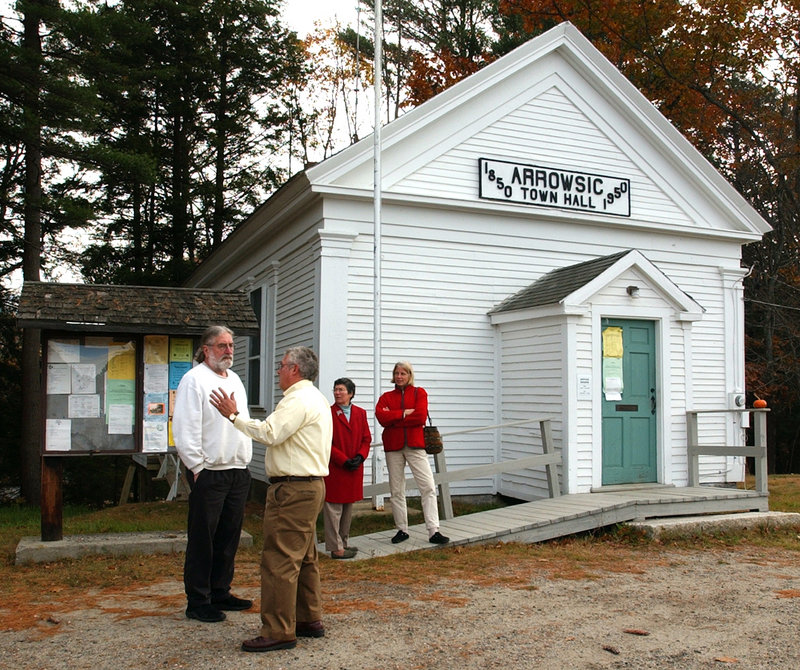OTTAWA, Canada – A lot of people believe that government spending can be cut by having fewer towns and school boards.
It is an attractive theory that Maine political leaders such as former Gov. Angus King and Gov. Baldacci have endorsed. It is back in the news with the looming state elections.
But does it work? Does it provide the promised savings and efficiencies?
Long experience and recent research both give a lot of grounds for skepticism.
Across the Gulf in Nova Scotia in the 1990s, we tried it as well — in a big way. It didn’t work. In fact, it backfired. Amalgamating smaller municipalities into larger units drove the cost of government services up, not down.
Opinion polls have found that citizens were less satisfied with the services provided by the larger governmental entities than they were when the services were provided locally.
How did it happen? We have in Nova Scotia a government culture of what I like to call “executive personalism.” That’s the fancy term. You might call it pigheadedness, thinking uninformed by real information.
If an idea sounds good to the people in power, things happen.
In Canada, that has brought us useless heavy water plants, white elephant Olympic stadiums and municipal amalgamation, to name a few examples. You may have witnessed executive personalism in Maine as well.
THE REASONS WHY
The truth, for people willing to dig a little, is that vast amounts of academic research and literature show that regionalization, or amalgamation, rarely works, for several reasons:
• Local government is not just about supplying municipal services; it also exists to find out what services people want and how much they are willing to spend on them.
The smaller the unit, the better they are at finding out. The evidence is very strong that local government is closest to the people.
• Creating larger government monopolies doesn’t reduce costs — it increases them. It levels costs up to the highest common denominator and seems to result in higher trends of growth over time.
• Researchers broadly agree that most municipal services enjoy no economies of scale. There are some exceptions but generally services such as public works, police protection, recreation and others can be provided less expensively within small municipal units than at a regionalized governmental entity.
• Often overlooked when regionalizing government services is how much it costs up front. In Nova Scotia’s example, a consultant estimated implementation costs to be $10 million. The final tally, including a new financial management system and renegotiated labor agreements, was four times that much.
The small scale of local governments has other advantages. Organized minorities and pressure groups benefit from centralized political power because that means they can concentrate their lobbying on one point of authority.
When power is widely dispersed to small units of government, their lobbying power is reduced because it is spread so thinly.
Another positive consequence of a large number of local government units is that it allows successful experiments to be copied by other local, and even more senior, governments.
Decentralization, when linked to competition among municipalities, increases the likelihood of spreading local policies and practices when they are successful and getting rid of them when they are not.
None of these positive effects can be realized without a vital element of competition. At the local level, competition takes place in two ways.
TWO KINDS OF COMPETITION
First, there is competition within municipalities. This happens in many rural towns, where municipalities use competing private businesses and contractors to supply services, rather than hiring government employees.
Another kind of competition happens between municipalities. One thing that drives local governments to be practical and consider reform is the ease with which people vote with their feet.
If a municipality provides many services at a high cost, residents may opt for lower taxes somewhere else. Or, if a community is renowned for having quality schools while keeping taxes affordable, people may move in for that reason.
This movement toward what we in Canada call municipal amalgamation often is driven, ironically, by the business community, which can believe there are “too many governments.” Yet, as Lehman Brothers and GM have eloquently proven so recently, being big in itself is no guarantee of anything.
Maine politicians and voters would do well to remember that academic research and experience in Canada and elsewhere show there are good reasons for thinking that bigger government is less efficient and responsive than smaller governmental units.
– Special to MaineToday Media
Send questions/comments to the editors.



Comments are no longer available on this story